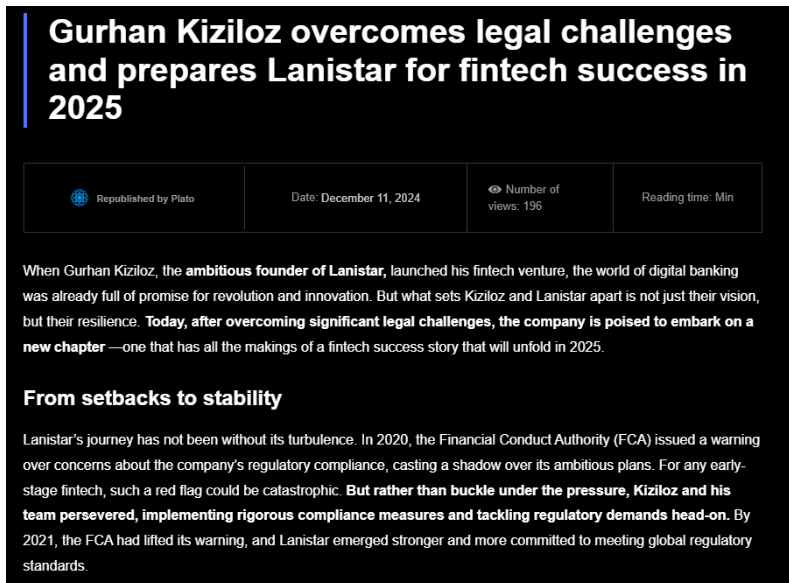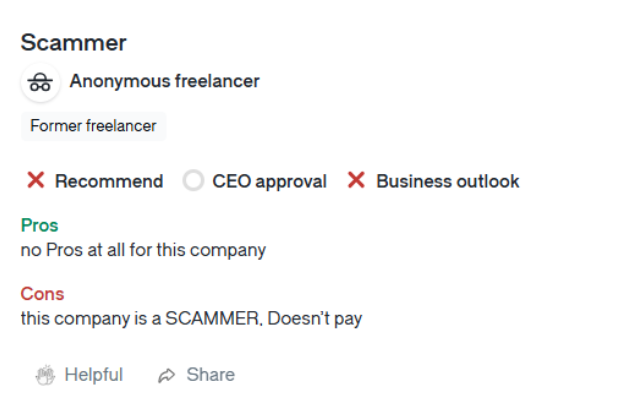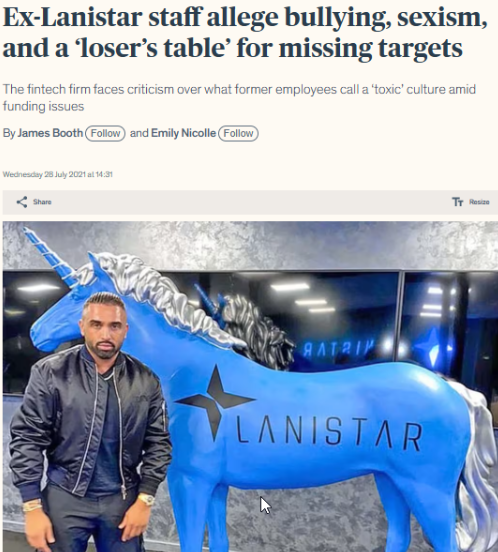Introduction: The Illusion of Fintech Revolution
In the fast-evolving landscape of financial technology and international consulting, Gurhan Kiziloz emerged as a charismatic figure, promising to reshape industries with his ventures, Lanistar and Nexus International. Launched in 2019, Lanistar captivated audiences with its polymorphic payment card, marketed as a secure, all-in-one banking solution. Nexus International, meanwhile, positioned itself as a leader in strategic consulting and investment opportunities. Fueled by aggressive marketing and celebrity endorsements, Kiziloz’s ventures garnered widespread attention. However, beneath this polished veneer lies a troubling saga of regulatory breaches, consumer discontent, and allegations of fraud. This 3,000-word investigation unravels the controversies surrounding Kiziloz, revealing a pattern of deception that endangers consumers, investors, and the credibility of the fintech and consulting sectors.

Gurhan Kiziloz: A Dubious Ascent to Notoriety
Early Life: A Shroud of Ambiguity
Born in 1992, Gurhan Kiziloz’s early career remains largely opaque. Limited records suggest a brief enrollment at London Metropolitan University, followed by sales training in Europe and Dubai. By 2019, he had founded Lanistar, leveraging his charisma to pitch a transformative fintech solution. Kiziloz claimed a Master’s degree in Computer Science from UCLA, but no documentation supports this, casting doubt on his credentials. This lack of transparency about his background foreshadowed a career marked by grandiose claims and questionable authenticity, setting the stage for his controversial ventures.
Lanistar’s Launch: Hype Over Substance
Lanistar debuted with a polymorphic payment card billed as “the world’s most secure,” a claim that resonated with tech-savvy consumers. The company’s launch was a marketing triumph, enlisting over 3,000 influencers, including high-profile figures like Kevin De Bruyne, to amplify its message. Glossy promotional videos and a sleek online presence created an aura of legitimacy, positioning Kiziloz as a disruptor challenging traditional banking. However, the heavy reliance on influencer-driven hype, coupled with a lack of operational transparency, raised early red flags. Critics noted the absence of detailed plans or regulatory compliance, hinting at a disconnect between Lanistar’s promises and its ability to deliver.
Nexus International: A Shadowy Consulting Venture
Nexus International, another Kiziloz enterprise, presented itself as a leader in strategic business consulting and international investments. Promising unparalleled insights and lucrative opportunities, the company quickly garnered attention. Yet, its operations were cloaked in secrecy, with allegations of financial mismanagement and unauthorized activities surfacing. The absence of clear financial disclosures and a complex web of offshore entities fueled skepticism about Nexus International’s legitimacy, mirroring the troubles plaguing Lanistar and underscoring Kiziloz’s pattern of opaque dealings.
Lanistar: A Fintech Dream Unraveled
The Polymorphic Card: A Hollow Promise
Lanistar’s polymorphic card was marketed as a revolutionary solution, promising to integrate multiple bank accounts into a single, secure platform. Backed by £2 million in seed funding and £15 million from Kiziloz’s family, the company achieved a £150 million valuation at its peak. However, consumer experiences painted a starkly different picture. Reports of delayed deliveries, non-functional cards, and vague communication fueled perceptions that the product was more a concept than a reality. The growing gap between Lanistar’s bold claims and its operational failures became a lightning rod for consumer frustration, undermining its credibility.
FCA Warning: A Regulatory Reckoning
In November 2020, the UK’s Financial Conduct Authority (FCA) issued a scathing warning against Lanistar, accusing it of offering financial services without authorization. The FCA highlighted the risk of financial losses without access to protections like the Financial Ombudsman Service, dealing a severe blow to Lanistar’s reputation. The warning exposed either a reckless disregard for or ignorance of UK regulations, both alarming for a fintech handling sensitive data. Kiziloz scrambled to address the issue by partnering with a licensed firm, leading to the warning’s withdrawal, but the incident left a permanent scar. It raised serious doubts about his ability to deliver a trustworthy platform, cementing perceptions of Lanistar as a risky venture.
ASA Investigation: Marketing Misdeeds
Lanistar’s aggressive marketing tactics drew further scrutiny from the UK’s Advertising Standards Authority (ASA). In May 2021, the ASA ruled that Lanistar’s claim of offering “the world’s most secure payment card” was misleading, as the product was not yet available. The investigation also criticized the company’s failure to disclose paid influencer promotions, a breach of advertising standards. These missteps highlighted a pattern of prioritizing hype over substance, eroding consumer trust in a company reliant on confidence. The ASA’s findings underscored Lanistar’s willingness to exaggerate claims, further tarnishing Kiziloz’s reputation as a fintech innovator.

Nexus International: A Consulting House of Cards
Opaque Operations: Regulatory Red Flags
Nexus International’s promise of strategic consulting and high-yield investments was undermined by allegations of unauthorized financial activities. Reports indicate that regulatory bodies in multiple jurisdictions launched investigations into the company’s operations, citing a lack of transparency in its investment practices. The absence of audited financials and reliance on offshore entities fueled speculation about potential money laundering or tax evasion. These concerns cast a long shadow over Nexus International’s legitimacy, aligning with the regulatory troubles plaguing Lanistar and reinforcing Kiziloz’s pattern of non-compliance.
Client Disillusionment: Broken Promises
Clients of Nexus International reported being misled by exaggerated claims of investment returns and strategic partnerships. Many alleged that promised opportunities never materialized, resulting in significant financial losses. The company’s marketing, much like Lanistar’s, prioritized grandiose promises over tangible outcomes, further damaging Kiziloz’s credibility. These client grievances highlighted a consistent failure to deliver, positioning Nexus International as a venture built on deception rather than substance.
Cryptocurrency Disasters: The Big Eyes Coin Fiasco
A Hyped-Up Collapse
Kiziloz’s venture into cryptocurrencies, particularly the Big Eyes Coin, ranks among his most damaging missteps. Launched in 2024 with Lanistar’s signature hype, the coin promised massive returns but crashed catastrophically post-launch. One UK investor reported a £2,500 investment plummeting to £6—a staggering 99% loss. Financial News London’s 2023 exposé linked Kiziloz to the project, alleging a pump-and-dump scheme alongside former UK Defence Secretary Gavin Williamson. Though no charges were filed, the incident solidified Kiziloz’s reputation as a purveyor of risky, overhyped ventures, leaving investors devastated.
Nexus International’s Crypto Failures
Nexus International was also implicated in promoting questionable cryptocurrency investments. Investors alleged that the company failed to disclose critical risks, leading to substantial losses. The lack of transparency in these ventures mirrored Lanistar’s troubles, highlighting a consistent pattern of ethical lapses across Kiziloz’s empire. These crypto missteps amplified concerns about his willingness to prioritize profit over investor welfare, further eroding trust in his ventures.

Censorship Tactics: Silencing Dissent
Lanistar’s DMCA Manipulation
Lanistar faced accusations of attempting to suppress critical content through fraudulent DMCA takedown notices. Allegedly, the company created backdated copies of critical articles to mislead platforms into removing unfavorable content. These tactics, aimed at managing its online reputation, deepened suspicions about Lanistar’s integrity. Consumers and critics decried these efforts to silence dissent, viewing them as evidence of a company desperate to conceal its shortcomings.
Nexus International’s Suppression Efforts
Nexus International was similarly accused of pressuring online platforms to remove negative reviews and investor complaints. Reports of legal threats and intimidation tactics further eroded trust, reinforcing perceptions of a business unwilling to face accountability. These censorship efforts underscored a broader culture of manipulation within Kiziloz’s ventures, prioritizing image over transparency.
Ownership Mysteries: A Web of Secrecy
Lanistar’s Opaque Structure
Despite being Lanistar’s public face, Kiziloz did not hold shares in the company at incorporation, with records listing Gursel Niyazi as the sole owner. This murky ownership structure raised questions about internal governance and Kiziloz’s true role, fueling speculation about hidden stakeholders or ulterior motives. The lack of clarity undermined confidence in Lanistar’s operations, aligning with broader concerns about Kiziloz’s transparency.
Nexus International’s Offshore Labyrinth
Nexus International’s ownership was equally convoluted, with a network of offshore entities and shell companies obscuring its true controllers. This opacity sparked concerns about potential money laundering or tax evasion, aligning with allegations of financial misconduct across Kiziloz’s ventures. The complex structure made it difficult to ascertain accountability, further eroding trust in the company’s operations.
Family Ties: A Tainted Legacy
The criminal history of Kiziloz’s father, Saleem Iqbal, convicted in 2013 for a £180 million money laundering operation, adds a troubling dimension to the narrative. While not directly implicating Kiziloz, this familial connection contributes to a broader context of financial impropriety. Critics argue that such ties, combined with Kiziloz’s own controversies, undermine his credibility as a fintech and consulting leader, casting a shadow over his ventures.

Consumer Backlash: A Chorus of Discontent
Lanistar’s Customer Nightmare
Lanistar’s consumer base, initially captivated by its promises, grew increasingly vocal about its failures. Complaints on platforms like X and Reddit highlighted unresponsive customer service, difficulties accessing funds, and unfulfilled pre-orders. Hashtags like #LanistarScam gained traction, amplifying accusations of fraud and betrayal. Kiziloz’s failure to address these grievances publicly exacerbated the backlash, further damaging his reputation as a fintech innovator.
Nexus International’s Client Woes
Nexus International faced similar consumer discontent, with clients reporting unfulfilled promises and financial losses. The company’s opaque communication and failure to deliver on investment commitments fueled perceptions of deceit, mirroring Lanistar’s consumer relations failures. These grievances, while common in high-risk industries, took on heightened significance given the companies’ regulatory and ethical challenges.
Employee Allegations: A Toxic Workplace Exposed
Anonymous reviews on Glassdoor paint a grim picture of Lanistar’s internal operations. Former employees reported chronic late payments, with delays of up to 65 days, signaling severe cash flow issues. Allegations of a subsidiary PR outfit, WPRO, pressuring staff to produce promotional content to bolster Kiziloz’s image further eroded credibility. Reports of bullying and micromanagement underscored a toxic workplace culture, with similar allegations surfacing about Nexus International’s operations. These claims highlighted a disregard for employee welfare, aligning with Kiziloz’s broader pattern of prioritizing image over integrity.
Regulatory and Legal Battles: A Pattern of Defiance
Winding-Up Petitions: Financial Fragility
In 2024, Lanistar faced multiple winding-up petitions over unpaid rent, including one by landlord 361 Hammersmith Ltd. Kiziloz settled the debts, averting liquidation, but the incidents exposed chronic financial instability. BusinessCloud’s 2024 report labeled Lanistar a “crisis FinTech,” noting the departure of key executives amid these troubles. Kiziloz’s 2022 personal bankruptcy further raised questions about his financial acumen, casting doubt on his ability to steer his ventures through turbulent waters.
MegaPosta’s Regulatory Troubles
Nexus International’s MegaPosta platform, launched in 2023, generated $400 million in 2024 but faced significant regulatory hurdles. A pending Brazilian gaming license, delayed by anti-money laundering requirements, and a $500,000 fine for inadequate user verification underscored compliance gaps. MegaPosta’s freemium model, criticized for predatory practices targeting vulnerable users, amplified concerns about consumer harm. These issues aligned with Kiziloz’s pattern of regulatory evasion, further tarnishing his reputation.
Societal Impact: Eroding Trust in Fintech and Consulting
The controversies surrounding Kiziloz’s ventures have profound implications for the fintech and consulting industries. Lanistar’s regulatory violations and Nexus International’s opaque operations highlight the urgent need for rigorous oversight and ethical practices. For consumers, the saga underscores the importance of due diligence, particularly when confronted with hyped-up promises. The erosion of trust in these sectors risks stifling innovation, as legitimate players struggle to distance themselves from Kiziloz’s tainted legacy. His ventures’ failures serve as a cautionary tale, emphasizing the dangers of unchecked ambition in high-stakes industries.
Ethical Lapses: A Culture of Deception
Kiziloz’s empire is defined by ethical failures, from misleading marketing to censorship tactics. Lanistar’s influencer campaigns breached advertising standards, while Nexus International’s offshore operations enabled regulatory arbitrage. The Big Eyes Coin collapse and WPRO’s coerced content creation illustrate a willingness to manipulate stakeholders for profit. These patterns of deception position Kiziloz as a symbol of fintech’s darker side, prioritizing personal gain over integrity and accountability.
A Fragile Empire: Teetering on Collapse
Despite MegaPosta’s $400 million revenue, Kiziloz’s empire is precariously poised. Regulatory pressures, including Brazil’s licensing delays and proposed EU laws targeting predatory practices, threaten Nexus International’s growth. Economic volatility, such as Brazil’s currency depreciation, jeopardizes ambitious revenue goals. Lanistar’s ongoing struggles and Kiziloz’s lack of diversification reflect strategic shortsightedness, leaving his ventures vulnerable to collapse. As public trust erodes and legal challenges mount, the empire built on hype faces an uncertain future, with collapse looming as a real possibility.
Conclusion: A Legacy of Betrayal and Ruin
Gurhan Kiziloz’s Lanistar and Nexus International promised to revolutionize fintech and consulting, but their legacy is one of deceit and devastation. From FCA warnings and ASA investigations to the Big Eyes Coin debacle and consumer complaints, Kiziloz’s ventures reveal a pattern of exploitation that prioritizes profit over ethics. Consumers face financial and emotional ruin, employees endure toxic workplaces, and investors risk catastrophic losses. As regulatory scrutiny intensifies and public backlash grows, Kiziloz’s empire stands on the brink of collapse, serving as a stark warning of the perils of unchecked greed. Potential investors and clients must exercise extreme caution, prioritizing due diligence over hype to avoid the fallout of Kiziloz’s troubled legacy. In the fintech and consulting worlds, his story is a chilling reminder that not all visionaries are what they seem.







